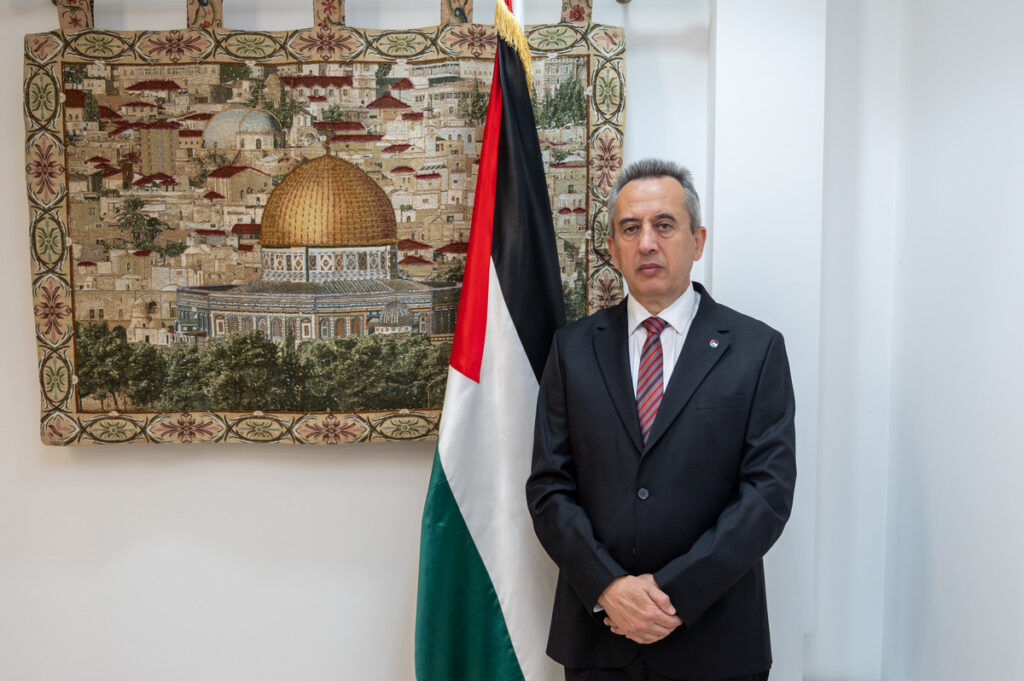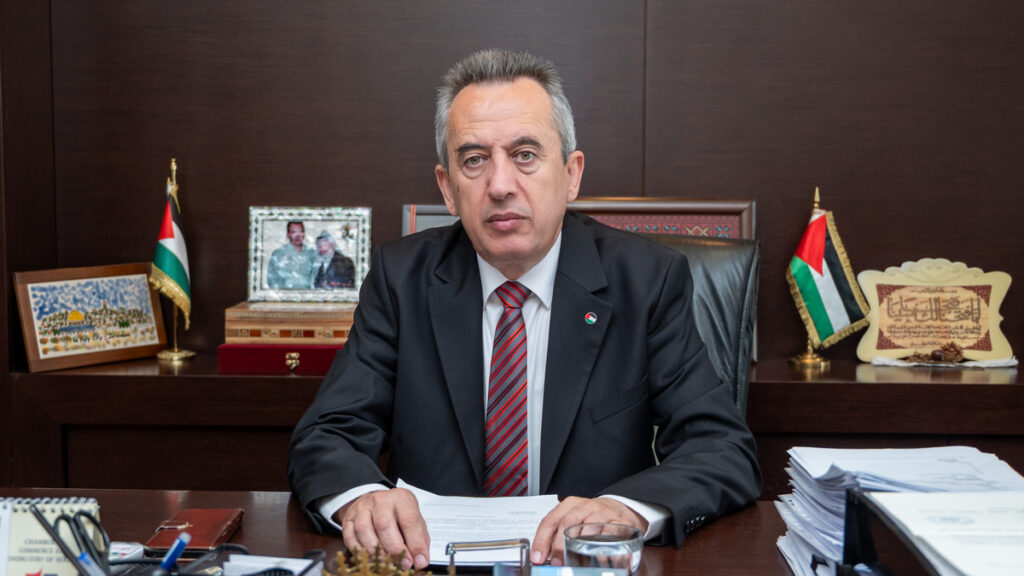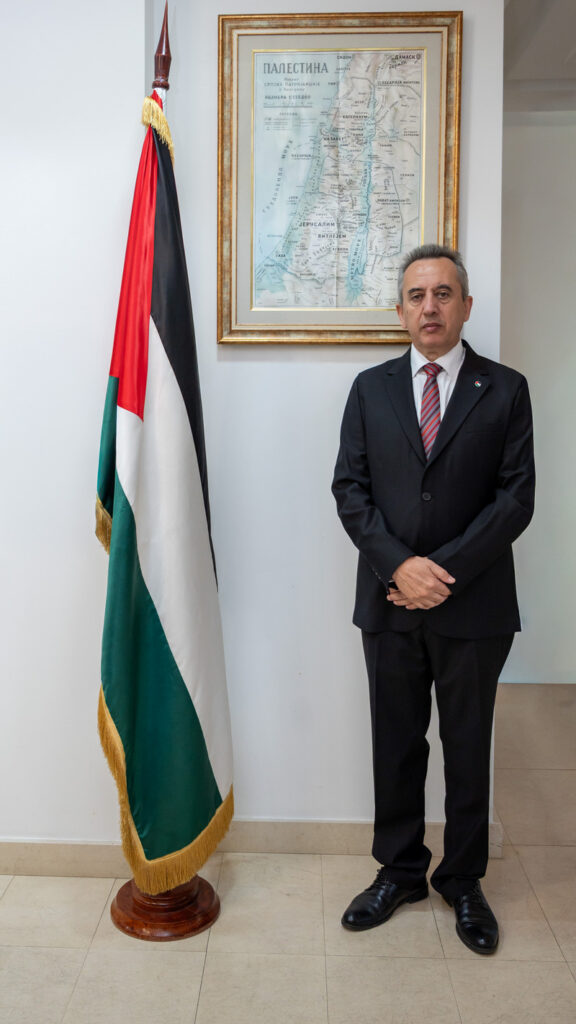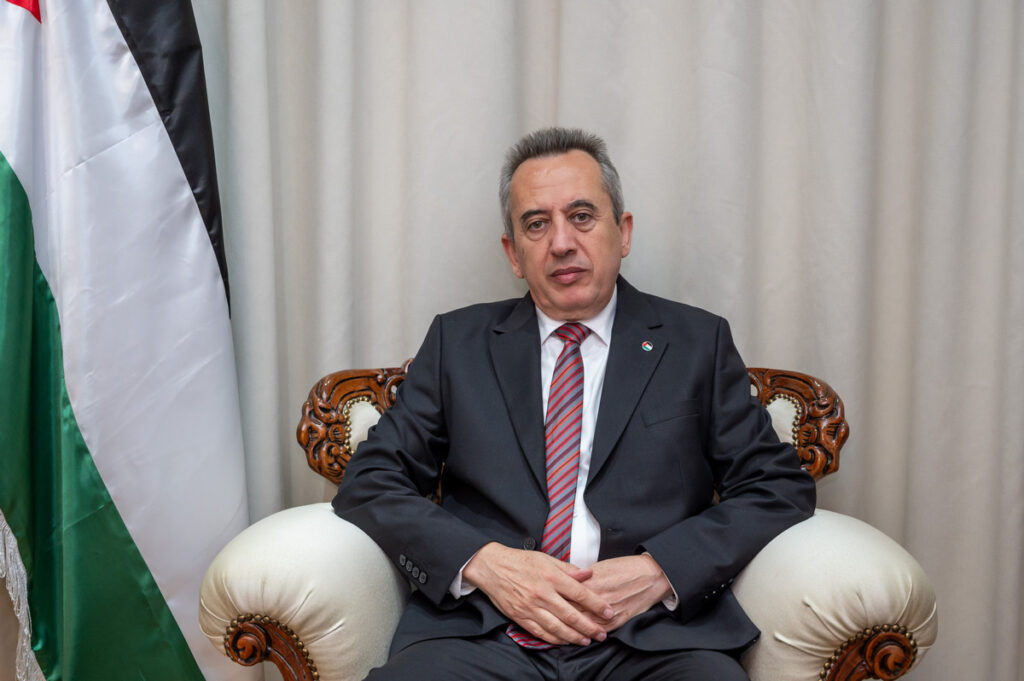As bombs fall and borders tighten, Ambassador Al Namura calls on the world to uphold international law and human dignity

AMBASSADOR’S INTERVIEW
by Mijat Kontić
H.E. Mohammed Al Namura
Ambassador of Palestine to Serbia
This interview was first broadcast on Diplomat, the talk show produced by Diplomacy & Commerce magazine and aired on Euronews Serbia.
While all eyes are on Palestine, the international diplomatic scene is gradually shifting. Today, we speak with Mohammed Al Namura, Ambassador of Palestine to Serbia, about his professional career, cooperation with Serbian institutions, and the evolving global stance on Palestinian statehood, from Brussels to Washington.
What Israel is using is not just excessive force—it is a war of genocide against the Palestinian people
To begin, could you tell us about your career prior to your appointment in Serbia? How have your previous experiences shaped your perspective on international relations?
Before coming here, and even to this day, I am a member of the Palestinian National Council, which is the parliament of the PLO, the Palestine Liberation Organisation. I also serve on the committee for parliamentary and foreign political affairs. Additionally, I am a member of the Revolutionary Council of Al-Fatah and its foreign political affairs committee. Previously, I worked in the Ministry of Labour in the Government of the State of Palestine in Ramallah. As a Palestinian, every one of us is involved in politics. Even while studying here, I was politically active and served as president of the General Union of Palestinian Students. That’s my background in brief.

You began your diplomatic post in Serbia in late August 2023. What have your experiences been so far in working with Serbian institutions?
Unfortunately, shortly after I arrived—within a month or two— the genocide against the Palestinian people began in Gaza. Many of the plans I had for my diplomatic work here had to be redirected. When your people are suffering genocide and extermination, when lives are lost every day, you must turn your attention to that. I’ve found good cooperation with institutions in Serbia. I’ve built strong relationships with municipalities and cities. Many of them have issued declarations of friendship or cooperation between Palestinian and Serbian cities. I’ve focused more on public outreach, especially to explain what is happening in Palestine. At the beginning, there was an Israeli invasion, and a media invasion as well. They spread false information and disinformation everywhere. We had to clarify the situation and show that what is happening did not come from a vacuum, as Guterres said, but is rooted in our Nakba of 1948, when Israel was established on the ruins of the Palestinian people and our land. This conflict has deep roots, long before the events of 2023.
We lived in Palestine in peace for over 12,000 years. We are one of the oldest peoples in the world. The Palestinian people were once called Canaanites. We lived in Palestine even before the emergence of any religion— before Judaism, Islam, or Christianity. When Abraham came from Iraq, he arrived in Palestine, where the Palestinian people and Canaanites already lived. Even the Torah says Abraham went to the land of Canaan. So we say: the Palestinian people have always lived in Palestine. It is our homeland. We are of different faiths—Muslims, Orthodox Christians, Catholics— and yes, there are Jews among us, but they are Palestinians, not Israelis. The Palestinian issue is not a religious one. It is political. It is about people who have lived on their land for centuries, and then an occupier arrived—today’s Israel— with the help of Western powers. They took our land, and to this day, the genocide continues. Even before 1948, massacres were committed in Palestine— in 1947, 1948, and after. Deir Yassin, Kibiya, Al-Dawayima, even Haifa and Lod— 950,000 Palestinians were expelled from their land. Many fled to Syria, Lebanon, the West Bank, Gaza, and Jordan. And sadly, we lost our homeland.
Just to add, the airport in Tel Aviv today was a Palestinian airport until 1948. Many of the Israelis who came then were refugees. We welcomed them. But later, they turned against us. They received Palestinian passports, ID cards, and used the Palestinian pound, which was worth 2.5 dollars. Even Shimon Peres, former president of Israel, came to Palestine as a worker, a cleaner. That’s documented in his own words. At the time, the British Mandate supported them. The Americans did not. And through that support, we lost our state and our land. To this day, our people suffer. Today, the Palestinian population is around 15 million, maybe more. Over 7 million live outside Palestine, and between 7.5 and 8 million live within. In Gaza, there are 2.3 million Palestinians. On the West Bank, over 4 million. Inside Israel, around 2 million. So within historic Palestine, we are the majority. And that is why Israel is now waging a genocidal war— to kill as many Palestinians as possible, to displace us from our land. On the West Bank, they are conducting ethnic cleansing, especially in small villages, among Bedouins and farmers. They attack homes and drive people out. This has been happening for 77 years, since 1948. It is the greatest crime in the world. It is an ongoing genocide, and now the world is watching it live.
Recognition of Palestine is not a gift. It is our natural, political, and historical right
Let’s return briefly to the history of relations between Serbia and Palestine, or rather Yugoslavia, which recognised the State of Palestine in 1989, which was a grand political gesture at the time. How do you view Serbia’s position today?
Yugoslavia recognised the State of Palestine on November 16, 1988— one day after our late leader, Yasser Arafat, declared independence in Algiers, on behalf of the Palestinian National Council. The next day, Yugoslavia recognised us. In 1988 and 1989, over 90 countries recognised the State of Palestine. At the time, there were around 156 UN member states. Not like today, with 193. In 1989, full diplomatic relations were established between Palestine and Yugoslavia, now Serbia. That’s when our embassy was opened. Before that, we had a political representation of the PLO, which later became the Embassy of the State of Palestine. To this day, we see Serbia as a friendly country. We see the Serbian people as friendly people. We ask all our friends to act in accordance with international law. We accept any country that treats us in line with international law. Although I must say, international law has often failed the Palestinian people, starting with the 1947 UN partition plan. Still, we accepted political solutions, peaceful solutions. In 1988, when we declared our state, we accepted that it would include the West Bank, East Jerusalem as our capital, and Gaza. We accepted it. And we ask the world to accept what international law requires.

Today, we see changes in Europe. Malta recognised Palestine on August 25, joining Ireland, Spain, Norway, and Slovenia. France has also announced its intention to recognise Palestine in September. Is this all just European political choreography or actual change that’s on the horizon?
We hope that the conference on September 22, led by France and Saudi Arabia, will bring real progress. It’s an important step. We believe the world is changing. We welcome these brave decisions. They are in line with international law. We have good relations with France and other EU countries. We have embassies there, and high-level diplomatic representation. We hope that once Palestine is officially recognised, these missions will become full embassies. In Jerusalem, France has a consulate general, but it functions as an embassy accredited to us. The same goes for the UK and many other countries. Even those without full diplomatic ties have political or diplomatic offices in Ramallah. France is a key country, a member of the UN Security Council. We hope the UK will follow. Russia and China already have. We expect many more countries to recognise Palestine. This is in line with international law.
Some people think Palestine has nothing to do with Israel. But Israel is the only country in the world without a constitution. They refuse to define their borders. The UN, even the Americans, recognise that the West Bank, Gaza, and East Jerusalem are occupied Palestinian territories. Recognition of Palestine is not a gift. It is our natural right, our political right, our historical right. We accepted having a state on just 22 per cent of historic Palestine. I, my father and my mother are refugees from 1948. We still have property there. I have documents from the UN proving it. We own hectares of land. Remind me after the recording, and I’ll show you the documents.
According to research by Reuters and IPSOS, 58% of Americans believe that Palestine should have the right to its own state, while 59% believe the force used by the Israeli military is excessive. Do you believe there is room for a shift in U.S. foreign policy toward Palestine, especially in light of growing criticism from the public and academic circles?
You know, what Israel is using is not just excessive force—it is, in fact, a war of genocide against the Palestinian people. When we say “excessive,” we mean that there is only one military force operating there: the criminal Israeli army, which is committing genocide against Palestinians in the Gaza Strip. You’ve seen it—the whole world has seen it—how they bomb ordinary people, civilians, unarmed individuals. Now they are systematically demolishing and flattening Gaza. They’ve even brought in companies with bulldozers. Each of these companies receives five thousand shekels for every house or apartment they destroy—that’s nearly fifteen hundred euros.
Imagine, these companies publicly report how many homes they’ve demolished, and they get paid five thousand shekels for each one—it’s well known. So when we look at this aggression, which began two or three days ago or continues toward Gaza City, they are now systematically destroying everything that remains—high-rises, buildings that haven’t yet been levelled. Their goal is to make Gaza uninhabitable so that people will be forced to leave. But to this day, the Palestinian people refuse to leave their land. They will not leave Gaza. The only thing that must withdraw is the occupier—the Israeli army, the Israeli occupation.
Our message is that we walk in step with history. Those on the side of justice stand on the right side of history
If you had to distil one message from all of this—a message of Palestinian diplomacy that the international community must understand—what would it be?
We always say: we stand for justice. We support anyone who walks the path of justice. There has been tremendous injustice against the Palestinian people from 1948 until today. We accepted diplomatic and political solutions. We accepted dialogue. We accepted it even before 1948, when our friends and many well-intentioned countries asked us to engage in dialogue and to establish a state on 22% of the land of Palestine, with Jerusalem as its capital. That was supposed to be the solution. We accepted it. Unfortunately, the other side—the occupying state of Israel—continues to commit genocide to this day. They still do not recognise our rights, and they think they can gift us something that is already ours. But this is our natural right—our historical right—this is our land. We are not the newcomers—they are. We are from Palestine. We have lived there throughout history, and we will remain in Palestine, without question.
We always say: we accept to act in accordance with international law. We accept political solutions. But our people must be free. There is no chance we will accept remaining under Israeli occupation. Because Israeli occupation—from 1948 to today— commits genocide, massacres, and crimes against the Palestinian people every single day, and steals our land.
Let me tell you one more thing: sometimes in the news, they say that Israel has allowed humanitarian aid. But when someone hears that, they think Israel is sending help. Do you know what they’re doing? That aid is not theirs. They refuse to release our funds—over 11 or 12 billion shekels to this day. They’ve taken our money, and from that, they finance what they call “humanitarian aid.” Moreover, when people go to wait in line for aid, they bomb them—sometimes even for fun. Soldiers do it for amusement. You can see it online—how these soldiers brag, sending messages to their girlfriends for their birthdays, saying they destroyed an entire neighbourhood. The whole world sees this.

That’s why we say: Israel must be held accountable for what it is doing to the Palestinian people. You know that Netanyahu has now been declared a war criminal, along with Galant, Ben Gvir, Smotrich, and Eliyahu, who have called for Gaza to be bombed with a nuclear weapon. There are a thousand messages that can be sent to the world about all of this.
Before the events of 2023, did the embassies of Palestine and Israel have any communication, at least in Belgrade? What is the situation today? Do you greet the Israeli ambassador when you see her at receptions?
Since I arrived, even before all of this happened, I have never had any contact. And I still have no contact with representatives of the genocidal government of Israel. I have no contact, and I have no interest in having one. If there were ever to be any contact, it would be official, through our state, our government. But I, as ambassador here, have no need for such communication.
The only solution is a sovereign Palestinian state with East Jerusalem as its capital and the return of refugees
How do you see the future of relations between Serbia and Palestine in the coming years?
You know, we are hopeful, and as I’ve already said, we see Serbia as a friendly country. The Serbian people are a friendly people. Since the genocide and aggression in Gaza began, perhaps you’ve seen it—at the gates of our embassy, people came in groups, bringing candles, lighting them, printing and posting images. People came, sending messages of support to the Palestinian people through phone calls and emails. I thank the Serbian people for that support. As we always say, everything must be in accordance with international law. We expect our friendly country, Serbia, as well as the entire world, to act in accordance with international law. We hope Serbia will not participate in any form of complicity in the genocide against the Palestinian people. Israel, as recognised by the entire world—including Western Europe— must not engage in military cooperation, arms sales, ammunition transfers, or anything that violates international law and the rulings of the International Court of Justice from last year.
For the end of this interview, what message would you like to convey to our readers?
My message is that the problem must be resolved peacefully, through political means. It cannot be resolved through force, as Israel attempts. The Palestinian people are not a people that can be defeated. We will certainly not remain under occupation. Our message is that we walk in step with history. Those who go against history—that is the Israeli occupation. We always say: we walk in step with history. Those who stand on the side of justice and rights are on the right side of history. Those on the opposite side are on the wrong side of history.
The only solution to the Palestinian issue is for us to have sovereignty over a recognised state— a sovereign state that includes the West Bank, including East Jerusalem as its capital, naturally with the Gaza Strip, and the return of refugees from 1948, along with the resolution of all remaining issues. We have accepted this through political means, in accordance with international law. Then everything would be resolved without problems— then peace would prevail. And all people would live in peace. That is our message.